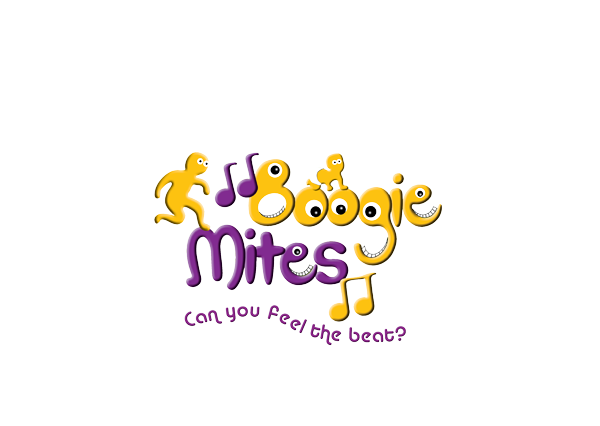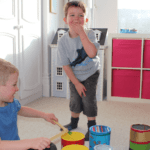
Boogie Mites (BM) teachers have been leading courses for parents and pre-school children every summer for more than 10 years across Hampshire, Surrey and some London Boroughs. The aim is to support the transition to primary school and encourage parent involvement in home practise of music activities that focus on developing strong foundations for literacy.
Parents are invited to join an onsite music session with their children during the summer term, prior to starting school. These courses are funded by local authorities or individual school’s transition budgets. The sessions cover active music-making and outline how the activities support the foundations for literacy. Parents are also given resources for home practise through the summer holidays.
Adapting for online summer 2020
In summer 2020 we had to move these courses online. We trialled a 3-week online course, delivered over Facebook in a private group for each participating school. We developed this format for our courses with Hampshire County Council (HCC), which require that RARPA (Recognising and Recording of Progress and Achievement) was taking place. The data collected was independently evaluated by Achievement For All (AFA), a not for profit organisation.
The purpose of this report was to provide evidence of impact of the project, Online School Ready Through Music. The report gives an overview of the work undertaken and the impact against key objectives. The report can be used to demonstrate value for money to the funder, as evidence of impact for partners supporting the project (schools), for future funding bids and to influence future delivery plans.
Context of the project
The project was commissioned by HCC, and delivered by BM, as part of their Family Learning programme during the Covid 19 lockdown. The schools selected were from disadvantaged areas of the county. The parents with children starting at school in September who would benefit the most, particularly with speech and language, were encouraged to attend. Some schools offered it universally and then encouraged particular parents, others just invited targeted parents. 24 schools took part with 292 parents enrolled, of whom 279 completed the course, a completion rate of 95%.
Description of the project
The course consisted of 3 x 45 minute sessions, delivered on Facebook. If a parent was unable to watch live, they could watch the recorded session at a later time. The sessions consisted of games, songs, and activities to support parents with home learning activities. The tutor contacted the parents after each session and there were follow up activities to complete at home.
Course objectives
At the end of the course, learners will be able to:
- Name and describe each of the 7 Aspects of Letters and Sounds Phase 1
- Practise creative music and craft activities at home to support the development of foundations for literacy
- Identify their child’s development and progression in relation to the 7 Aspects of Letters and Sounds Phase 1
Individual Goals
The course also had 5 optional individual goals that parents could select as their own in the initial assessment or leave unchecked:
- To learn how music can support children’s development
- To bond with my child through this shared experience
- To learn how to support my child’s school ready literacy, listening and learning skills through music
- To obtain resources and knowledge to continue home practise throughout the summer
- To start a learning journey for myself and to find out what other courses are available to me
The analysis of data collected on initial assessments, end of course evaluations and weekly learning diaries can be read in the full report.
Report conclusion
Using the parental feedback gained, it is clear to see that the project met its course objectives. The high completion and achievement rate of the course and the commitment to accessing the sessions live is evidence that parents found it enjoyable and useful.
An area of significant impact is the increase in parents now undertaking creative activities to support their child’s learning at home, with 100% of parents who responded doing at least some. There is a weight of evidence that concludes that the greatest impact on children and young people’s learning arises from the things that parents/carers do with them at home.
AFA wholeheartedly recommends this project as a key method of increasing knowledge and skills of parents and engaging them in their child’s learning and development.
Reflection
On reflection, there were many advantages to running transition courses online compared to onsite.
Advantages:
– the sessions could be watched at any time making them accessible for working parents and available to repeat. This repetition is very valuable for children’s development.
– parents had a direct line of communication with the tutor, allowing them to raise issues or questions privately, and allowing tutors to contact parents to chase attendance and submission of forms.
– parents could post suggested craft and home practice photos to share with the group. This may have increased other parent’s motivation for home practice.
– creating a community where people could feel the benefit of support in the comfort of their own home. Many parents commented on enjoying taking part in the privacy and comfort of their own home.
– we reached less confident parents who would not have attended an onsite group.
– we engaged with children who had a short attention as they could take part in short sections. These parents may not have stayed or attended an onsite group.
– the class teacher could comment on the sessions, on children’s craft and home practise photos. This was found to be a motivation for home practise.
Disadvantages:
– loss of social interaction, the teacher builds relationships with the parents and children at onsite groups. For the children, these social skills are a big bonus to all the learning benefits music brings.
– parents and children could not build relationships with each other, something that is a wonderful wider benefit of our groups in the community.
– the tutor could not observe the progress of individual parents or children, so they lost the opportunity for direct support tailored to individuals.
– the class teacher cannot join to meet the families and the families could not experience the school visits. This is a loss for children who might gain confidence about the school if they have attended onsite transition sessions in the summer term.
We therefore recommend a combination of onsite and online transition when possible.
We hope to secure funding to measure the impact of our School Ready Literacy Music Programme, as an intervention which supports transition and closes the attainment gap at this vital stage.
Contact [email protected] for more information or to book for your school.






